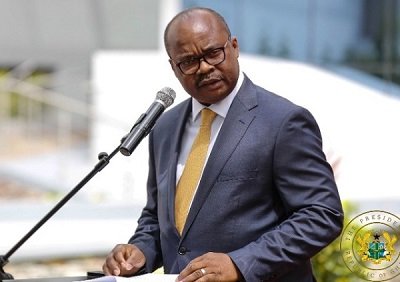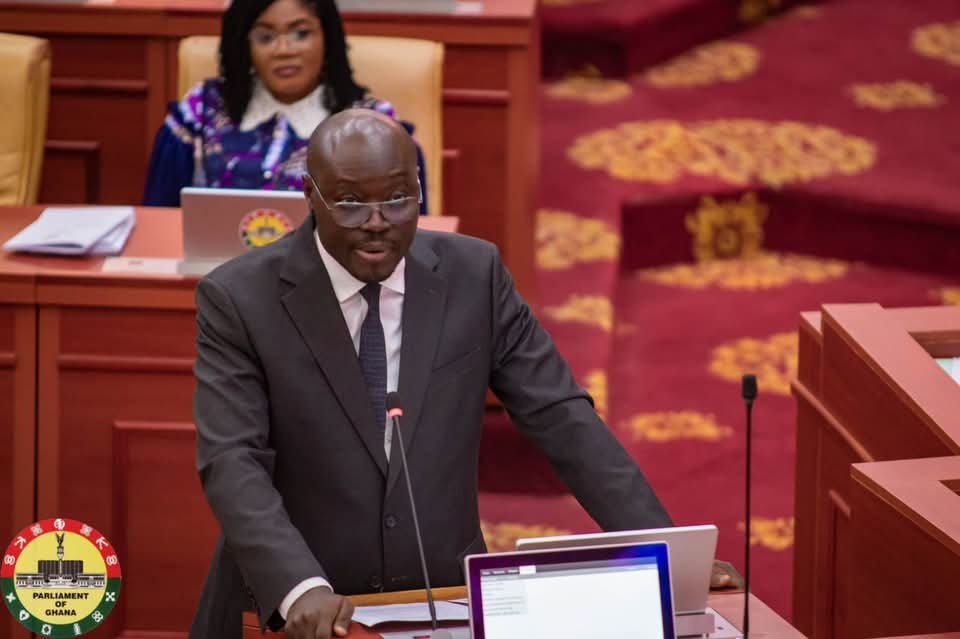Bussiness
BoG takes banking education to churches, mosques

Apart from the mandate of the Bank of Ghana (BoG) to formulate and implement policies to ensure price stability and promote the general economic growth of the country, the regulator is equally concerned about promoting the interest of the customers of banks and financial institutions.
Indeed, a section of the Bank and Specialised Deposit Taking Institutions Act enjoins the BoG to initiate measures to protect the interest of consumers of banks and financial institutions and also educate them on their rights and responsibilities.
As much as banks and other financial institutions play important roles towards the development of any economy through financial intermediation and mopping up excess capital for the government and private sector to borrow to fund development projects, so are customers.
Banks and financial institutions cannot exist without customers or consumers of their products and services. Banks and, for that matter, financial institutions, do not have money of their own. They, among other things, depend largely on the savings and deposits of customers to do business.
Indeed, savings remain one of the cheapest sources of funding for banks and financial institutions. If individuals decide to keep their monies at home, banks and other financial institutions would lack capital to effectively play their intermediary roles.
That is why banks and the financial institutions run mouth-watering promotions to entice people who have excess money to deposit with them.
Also, the core business of banks and financial institutions to trade money and generate good returns for their shareholders will not be realised if there are no customers to borrow from them. Banks and financial institutions are able to generate a lot of profits because there are customers to borrow their funds, which can be an individual customer, a private entity or the government.
In essence, customers can be likened to the “golden goose that lays the golden eggs” and must be fed properly. In other words, customers of banks and financial institutions must be pampered and treated with care and respect.
But the relationship that exists between banks and financial institutions and their customers seems to be unfair. It’s like a fight between the ant and the elephant for which there must be a mechanism to ensure fair play. Like the elephant, the banks come from a position of strength because of their financial capacity.
For, example, if a litigation arises between a customer with small savings and a bank, the latter has the financial muzzle to hire top-notch lawyers to defend it in court.
Largely, a section of the public perceive banks to be just profit-oriented with their focus and attention on corporate bodies and investors with big investments in the banks, not people with small savings.
That is the reason the BoG must be commended for taking the lead to bring banking education to the doorstep of the citizens.
Ordinarily, the banks should have been at the forefront of the aforementioned programme, but as a proactive organisation under the leadership of Dr Ernest Addison and his two Deputies, Dr Maxwell Opoku-Afari, First Deputy Governor, and Mrs ElsieAddo Awadzi, Second Deputy Governor, the BoG has decided to move to educate the customers of banks on their rights and responsibilities.
Encouraging as it is, the sensitisation programme is being done few years after the recent banking crisis.
The crisis largely centres, among other things, on bad corporate governance, insider trading, and related party activities, and this could have been avoided if customers had raised flags about the ‘bad’ operations of their banks.
It must be stressed that though the BoG can be criticised for the regulatory lapse which led to the crisis, the bank cannot be solely blamed for the banking mishap.
The BoG cannot be everywhere, so if customers do not alert it of suspicious activities of their banks, there is little it can do.
The BoG’s sensititisation programme is being carried out across the country in churches, mosques, markets and among organised groups and associations.
But first, it has started the exercise from the Greater Accra Region with focus on churches and mosques.
The first of such exercise was held at the St Paul’s Catholic Church at Kpehe in Accra last weekend.
The nationwide sensitisation programme, among other things, is to educate the banking public on their rights and responsibilities and to also elicit the concerns of customers of the various banks in the country for action and redress.
At the forum at the Kpehe St Paul’s Catholic Church, members raised questions about the high penalty imposed on them by their banks for not servicing their loans early and whether they can send their relatives to withdraw money on their behalf.
Also, the members were taught that it was an offence to issue a cheque if one did not have money in one’s account.
The enthusiasm showed by the church members through the questions they posed to the officials, when the floor was opened for questions, demonstrated the importance the church attached to the exercise.
At a point, the church members drew the attention of the leadership of the church to impress on the BoG officials to also speak “twi” in view of the ‘big’ financial terms the officials were unleashing on them.
Interacting with the Head of Market Conduct Office, Financial Stability Department of the BoG, Franklin Asamoah, about the exercise, he explained that the programme had become necessary in view of complaints from some sections of the public about the challenges they were facing in accessing banking and financial services.
He said the Banks and Specialised Deposit Taking Institutions Act mandated the BoG to, among other things, work in the interest of the customers of banks and financial institutions and educate them on their rights and responsibilities.
Mr Asamoah said under the Recourse Mechanism and Disclosure and Transparency of Services directives of the law, customers had the right to complain to their banks for poor services rendered to them.
“If your bank does not address your concern, you can escalate to the BoG and if still it is not addressed, you can proceed to court for redress,” he told the participants.
The Head of Financial Inclusion and Market Sensitisation Unit of the BoG, Mr Franklin Mensah, entreated customers to check if their banks were registered by the BoG.
He said the BoG mandated banks to place their licences at a visible place in the banking hall, adding that customers who suspected their banks of engaging in fraudulent activities should quickly report to the BoG.
Mr Mensah further entreated people not to rush for a loan but, should read loan agreement and conditions properly before they sign for it.
He cautioned the public about issuing dud cheques, saying “it is an offence to issue a cheque if you do not have money in your account.”
The Head of Market Conduct Supervision Unit of BoG, Mr Augustine Amoako Donkor, said the BoG had been receiving complaints on high interest rates, continuous deductions after finishing paying their loans, and penalty on non early payment of loans.
He said it was in that direction that the BoG had initiated the educational programmes to educate customers of banks about their rights and responsibilities.
Mr Donkor said the BoG was currently focusing on churches and mosques in the Greater Accra Region, adding the programme would be extended to the other regions and to markets and organised groups.
As indicated early on, the BoG must be commended for the intuition to lead the way in educating the public about the rights and responsibilities regarding accessing banking services.
The exercise will go a long way to help deepen financial inclusion, help customers to appreciate the importance of banking to the economy and their rights and responsibilities as banking customers.
It will also help to deepen the confidence of the public in the bank and financial institutions in the country.
The banks must actively support the BoG to make the exercise a success. It is in the interest of banks for their customers to know their rights and responsibilities for the services they render them.
By Kingsley Asare
Bussiness
Ghana to host mining and minerals convention 2025 to shape future of gold industry

Ghana’s gold and minerals sector is set for a major spotlight as Meetings. Co, in partnership with key industry stakeholders, announces the Mining & Minerals Convention 2025, scheduled from August 26-27, 2025, at the Kempinski Hotel Gold Coast City, Accra.
Held under the theme “Shaping the Future of Ghana’s Gold Industry,”‘ the Convention will convene government leaders, regulators, miners, refiners, investors, sustainability partners, innovators, and responsible mining, and global competitiveness,policy experts to explore strategies that position Ghana’s gold industry for long-term growth.
The two-day convention will feature presidential and ministerial keynote addresses, industry thought leadership, technical paper presentations, policy dialogues, fireside chats, exhibitions, and high-level networking sessions.
Convention delegates can anticipate a dynamic and insightful experience, marked by thought leadership from leading policymakers and regulators, in-depth discussions on key topics such as sustainability, ESG, digital gold, and responsible sourcing, as well as valuable opportunities to forge public-private partnerships and investment deals.
Moreover, the event will offer practical action points aimed at unlocking greater economic value for Ghana.
The 2025 edition will be supported by a strong coalition of strategic partners, including the Ministry of Lands and Natural Resources, the Minerals Commission, GoldBod, the Minerals Income and Investment Fund (MIIF), and the Ghana Extractive Industries Transparency Initiative (GHEITI).
Bussiness
Finance Minister tranfers funds to DACF, NHIS and GETFUND

The Minister for Finance Hon. Cassiel Ato Forson has disclosed that a sum of nine hundred and Eighty-Seven Million, Nine Hundred and Sixty-Five thousand and Seventy-Three Ghana Cedis (GHS987,965,073.00) from the Consolidated Fund into the District Assembly Common Fund Account, being the first quarter amount due to the DACF.
Furthermore, the Finance Minister informed the House that a total amount of Two Billion, Thirty- Three Million, Four Hundred and Sixty-Nine Thousand, Six Hundred and Seven Ghana Cedis (GHS2,033,469,607) has been disbursed to the National Health Insurance Fund.
While the Ghana Education Trust Fund has also received a total of Two Billion, Seven and Ten Million, Two Hundred and Twenty-Seven Ghana Cedis (GHS2,710,227,947.00) for the months January, February, March and April,2025.
The Finance Minister disclosed this in his statement to Parliament on the payments to statutory funds on the floor of the House.
In addition, he cautioned that the Administrator of the District Assembly Common Fund is required to ensure that 80% of this amount is transferred directly to the Assemblies without fail and expenditure returns submitted to the Ministry of Finance before subsequent releases will be made.
He added that Members are encouraged to monitor the utilization of these amounts sent to their respective Assemblies in line with the approved guidelines by Cabinet.
In his closing remark, Ato Forson said he’s going to take the concerns of the House seriously.
For his part, the Majority Leader, Mahama Ayariga made known the President’s prioritization of women in the country stating that President Mahama is “Pro-women”.
This is due to the fact that women are going to be the core beneficiaries from the expenditures going to be made by the MMDA’s, he added.
The Minority Leader Alexander Afenyo-Markin questioned the Finance Minister why road contractors have not been paid for more than five months. He said the Minister must not be applauded for since the allocation of these funds were long overdue.






